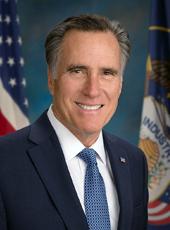"What the nation wants is someone who understands the economy, not, if you will, an economic lightweight. I mean, Senator Santorum is a nice guy, but he does not understand how the economy works. He has never had a job in the real economy. You have to understand this economy to be able to fix it." — Mitt Romney (Fox News' "America Live," 3/14/12)
Rick Santorum Is An Economic Lightweight — A Life-Long Politician With No Experience In The Economy:
Senator Santorum Is A Professional Politician, Having Been Elected To Congress In 1990 And Staying For Sixteen Years Until His 2006 Defeat. "In 1990, Mr. Santorum, then 32, was first elected to the House of Representatives, and four years later rode an anti-incumbent wave into the Senate. He won re-election in 2000, but after a bitter and expensive campaign lost his bid for a third term in 2006 against his Democratic challenger, Bob Casey, the Pennsylvania state treasurer." (The New York Times' "Election 2012" Website, 2/19/12)
The Wall Street Journal: "Mr. Santorum Often Gives The Impression That He Views The Economy As A Secondary Issue..." (Editorial, "Where's The Rest Of Them?" The Wall Street Journal, 2/9/12)
The Washington Post's Jennifer Rubin: "Santorum's Strong Suit Is Not The Economy." "As often as Santorum says he is going to migrate back to economic themes, he never seems to make it. That may be because his own economic views aren't very conservative, and his tax plan has more in common with the president's tax philosophy than with libertarians' and Republicans' views." (Jennifer Rubin, "Santorum's Strong Suit Is Not The Economy," The Washington Post, 3/14/12)
Cato Institute's Michael Tanner: "The Tea Party And 2010 Elections Were Largely About Economic Issues And The Desire To Limit The Size, Cost, And Intrusiveness Of Government. And Those Issues Are Not Santorum's Strong Suit." (Michael Tanner, "Santorum's Big-Government Conservatism," National Review, 1/4/12)
Rick Santorum Was Fiscally Irresponsible In Washington And Contributed To The Massive Fiscal Problems America Faces Today:
Santorum Brought Over $1 Billion In Pork-Barrel Spending Back To Pennsylvania. "In all, Taxpayers for Common Sense estimated, Mr. Santorum helped secure more than $1 billion in earmarks during his Senate career, which stretched from 1995 through 2006." (Michael Luo and Mike McIntire, "Donors Gave As Santorum Won Earmarks," The New York Times, 1/15/12)
- Club For Growth: "Santorum Was A Prolific Supporter Of Earmarks, Having Requested Billions Of Dollars For Pork Projects In Pennsylvania While He Was In Congress." ("2012 Presidential White Paper #4: Former Senator Rick Santorum," Club For Growth, 6/6/11)
- Santorum, In 2009: "I'm Very Proud Of All The Earmarks I Put In Bills. I'll Defend Earmarks." SANTORUM: "I'm not saying necessarily earmarks are bad. I have had a lot of earmarks. In fact, I'm very proud of all the earmarks I put in bills. I'll defend earmarks." (Fox News' "Hannity," 2/26/09)
"Santorum Acknowledged Voting To Raise The Federal Debt Ceiling At Least Five Times While In Congress." (Charles Babington, "Gingrich Defends His Attacks," The Associated Press, 1/15/12)
Federal Spending Increased By Roughly 80% During Santorum's Tenure In The Senate. In 1995, Santorum's first year in the Senate, federal spending was approximately $1.516 trillion. By 2007, when Santorum left the Senate, spending had increased to approximately $2.729 trillion. ("Fiscal Year 2012 Historical Tables Of The U.S. Government," Office of Management and Budget, 3/14/11)
Santorum: "I Came To The House As A Real Deficit Hawk, But I Am No Longer A Deficit Hawk ... I'll Tell You Why. I Had To Spend The Surpluses." "Confronted with projected deficits until fiscal 2007, senior GOP lawmakers are backing away from long-standing rhetoric about the government's duty to live within its means. 'I came to the House as a real deficit hawk, but I am no longer a deficit hawk,' said Sen. Rick Santorum (R-Pa.). 'I'll tell you why. I had to spend the surpluses. Deficits make it easier to say no.'" (Hans Nichols, "Leadership Lines Up With Deficit Doves," The Hill, 2/5/03)
Rick Santorum Was Part Of The Problem In Washington, So He Can't Be Part Of The Solution:
In 2006, Santorum Was Defeated In His Re-Election Bid By A "Stunning Margin" And "Lost Almost Every Region Of The State And Almost Every Demographic Group." "Santorum's loss was a long time coming. By the time of his nearly 18-point loss — a stunning margin for a two-term incumbent — he had also alienated women voters, moderate Republicans and independents — not to mention the Democrats he had once won over. He lost almost every region of the state and almost every demographic group, including the blue collar workers he singles out on the campaign trail in 2012." (Carrie Budoff Brown, "Landslide '06 Loss Undercuts Santorum's Bid," Politico, 1/5/12)
The Associated Press: "Even Some Conservatives Were Frustrated ... [And] Saw Him As Too Much A Part Of The Big-Spending Establishment." "By the time of his defeat as part of an anti-war, anti-incumbent tide, even some conservatives were frustrated with Santorum. Some saw him as too much a part of the big-spending establishment and others didn't like that he chose to endorse Arlen Specter, then a moderate Republican senator who years later would switch to the Democratic Party, over conservative Pat Toomey in the state's close 2004 Republican primary." (Andrew Miga, "Santorum Cites Appeal As Reliable Conservative," The Associated Press, 12/31/11)
Mitt Romney, Romney Campaign Press Release - Rick Santorum: An Economic Lightweight Online by Gerhard Peters and John T. Woolley, The American Presidency Project https://www.presidency.ucsb.edu/node/300895

